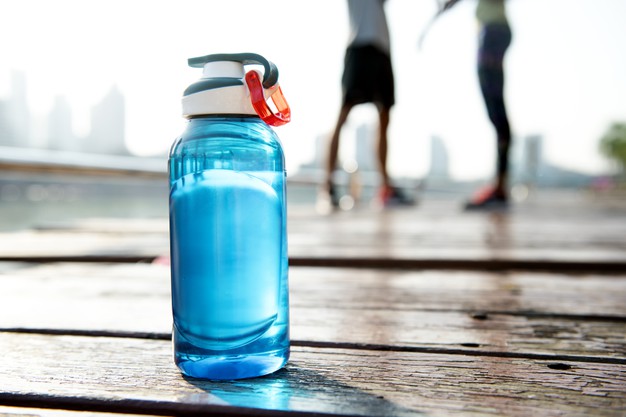Our topic today is “Maintaining Hydration”, which is one of the main objectives of sports nutrition. Let’s take a closer look at hydration in athletes:
As it is known, approximately 50-70% of the human body consists of water. Sixty percent of our daily water intake is met by fluid consumption, 30% by food consumption, and 10% by the water produced as a metabolic end product by the cells. Water loss from the body occurs through the skin, respiration, kidney and large intestine. At rest, fluid intake and loss are equal under usual environmental conditions. However, exercise can disrupt the fluid balance in our body.
Dehydration (acute dehydration) may occur during exercise depending on the exercise intensity, duration and environmental conditions. Plasma volume decreases due to fluid loss. The decrease in plasma volume leads to an increase in heart rate. In addition, as less blood is available to the skin, the heat distribution is disturbed and body temperature increases. Fluid and electrolyte loss also cause fatigue. All these situations can harm both health and performance.
“The onset of dehydration that damages performance is defined as the loss of 2% of body weight.”
A proper hydration plays a critical role in maintaining performance in athletes. However, several factors such as training intensity, ambient temperature, the number of daily training sessions, short breaks between training sessions and clothing selection can increase dehydration. For example, in sports such as ice hockey and American football, fluid loss during exercise is high due to the wearing of thick clothes. Then; What should athletes do to prevent dehydration and to rehydrate (acute recovery of body water)?
Maintenance of a balanced hydration plays a critical role in maintaining performance in athletes. However, reasons such as training intensity, ambient temperature, number of training, short breaks between training and clothing selection can increase dehydration. For example, in sports such as ice hockey and American football, fluid loss during exercise is high due to the wearing of thick clothes. In this case; What should athletes do to prevent dehydration and to rehydrate (acute recovery of body water)?
Hydration Recommendations for Athletes
- Before exercise: Daily fluid intake (1.5 ml / kcal / day) should be provided 24 hours before exercise. 5-10 ml / kg of fluid should be taken 2-4 hours before the exercise. The reason for pre-exercise fluid intake 2-4 hours before exercise is to allow excess fluid to be excreted from the body through urine.
- During exercise: It is recommended to drink 0.4-0.8 L of fluid per hour during exercise. However, this amount may vary depending on the athlete’s tolerance.
- After exercise: 120-150% of the total amount of fluid lost should be taken.
Evaluation of Hydration in Athletes
There are various methods to determine if the athlete has sufficient hydration level. The first of these is the follow-up of the color of the urine. The light yellow color of the urine indicates that the state of euhydration (body water balance) is achieved. Another method is to determine the changes in body weight. The most effective method for monitoring hydration is to monitor urine density from a few drops of urine by means of a refractometer. A urine density of less than 1.020 is evaluated as euhydration, 1.020-1.030 as hypohydration (lack of water in the body), and 1.030 and above as severe hypohydration
In conclusion, it is essential for athletes to monitor hydration and to comply with fluid intake recommendations to maintain performance. However, since each athlete’s sweating rate, exercise program and the amount of fluid intake during exercise are different, individual hydration programs should be prepared for athletes.
In our next article, we talked about sports drinks that are an important aid in maintaining hydration in athletes. You can find it here.
References
- American College of Sports Medicine, Sawka MN, Burke LM, Eichner ER, Maughan RJ, Montain SJ, Stachenfeld NS. American College of Sports Medicine position stand. Exercise and fluid replacement. Med Sci Sports Exerc. 2007 Feb;39(2):377-90. doi: 10.1249/mss.0b013e31802ca597. PMID: 17277604.
